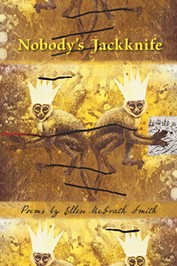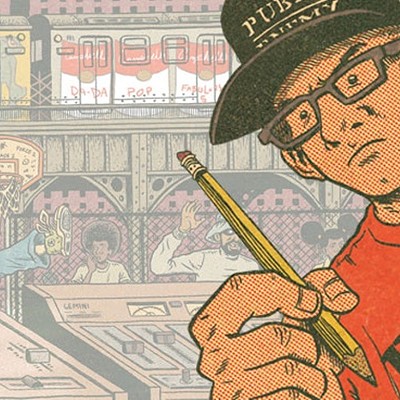Yoga master Erich Schiffmann once described the ancient mind-body practice as “a way of moving into stillness in order to experience the truth of who you are.” In the 84 pages of Ellen McGrath Smith’s first full-length poetry collection, Nobody’s Jackknife (West End Press), readers will find smart writing utilizing different forms (ghazal, pantoum) that mostly center on alcoholism and yoga. These disparate themes make for a wide-ranging book that allows Smith to explore her speaker’s self with an insight lending itself to hybrid forms and lyrical experimentation, with confessionalism kept to a minimum.
Smith, a Pittsburgh native with a doctorate from Duquesne University, has long taught at Pitt. A yoga practitioner for decades, she says in press materials that the genesis of Nobody’s Jackknife came from her telling a friend, “The closest I get to a buzz now is when I’m practicing yoga.” She listed all the drinks she ever tried, writing poems for the poses (asanas) she associated with that drink. It’s a nifty concept that plays out in unexpected ways.
“The Locust: A Foundational Narrative” is a killer prose-y piece that lays down important background including love for baseball and Roberto Clemente and not shying from moments of racism or a difficult father-daughter relationship. It’s the mother who introduces yoga to our speaker, with salabhasana (locust pose) being one she’ll attempt “again and again, and cry / because my body fails to hear the brain’s / commands. Inert and facedown, / I’ll try again and again.” The free association of “locust” (tree, insect, pose) throughout this sectioned poem adds to its playful poignancy.
The physicality described in many of the works keeps these poems grounded and balanced. In “Child’s Pose (balasana),” where the pose mirrors a child receiving corporal punishment, “the child / is architect of hunger; face in shadow, / knees, feet, forehead touch the floor. / A small soul’s scattered breath / and heartbeat echo, sounding out / the home inside the house.” As so often in the collection, the writing remains both muscular and sensitive.
Smith’s keen awareness takes a different form in “February Was Only Half Over”: “I realized after rolling coins, that my hands had touched everyone / somehow … / Filling every sleeve with my upright middle finger, / I was getting through the month and touching everyone.” An engaging debut, Nobody’s Jackknife trades not in transcendence but in poems of the body.















